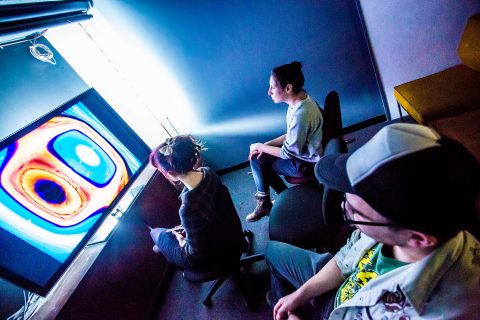Communication Studies (BA)
Why study Communication Studies?
We are one of the most established and respected Communication Studies programs in North America, and are well known for combining creative media production with the study of media theory, criticism and history. We draw from the humanities, social sciences and fine arts in a unique program that has trained many influential media makers.
You will work with a variety of media art forms and you will examine how meaning and ideas are communicated through media in various ways. In the first year you will create projects with sound, video and intermedia, as well as study theory, criticism and history of communications and media. You will be part of an exciting and dynamic team of students. You'll work together for three years, taught by an engaged and dedicated faculty of renowned scholars and artists.
Program highlights
- A mix of theory and practice with opportunities to learn about sound and visual media production in state-of-the-art labs
- Project-based learning with small groups of students
- The internationally-renowned Communication Studies program combines media theory, criticism and history with creative production courses in intermedia, moving images and sound.
Special funding for out-of-province students
Up to $4000 for undergraduate programs.
Program structure
A Bachelor of Arts degree takes a minimum of three or four years (90–120 credits) of full-time study, depending on your academic background.
Program options
- Major in Communication Studies (42 credits)
- Specialization in Communication Studies (60 credits)
Courses
Learn to analyze and critique media and popular culture by integrating an interdisciplinary knowledge from the humanities, fine arts and the social sciences.
United States students: A U.S. Federal Student Aid-eligible version of this program is offered. This version meets all U.S. regulations (such as no co-operative education or e-courses) for eligible programs.
Admission criteria
This program is only available for Fall admission.
Minimum cut-off averages and course requirements
- Quebec CEGEP: 24
- High School: B-
- ACT or SAT is NOT required
- Canadian curricula course requirements
- Accepted international qualifications
- International Baccalaureate (IB) diploma: 27
- International Baccalaureate Career-related Programme (CP): 4.5/7
- Baccalauréat français: 12
- British system of education (GCE):
- A-levels: At least two A-level exams CD or
- AS-levels: At least 4 AS-level exams with equivalent results or
- BTEC: Level 3 Diploma or Extended Diploma in a related subject area with equivalent results
- Additional information for British System of Education (GCE) applicants
- University Transfers (internal/external): B-
Additional requirements for admission
- Application Essay (Two parts uploaded as a single PDF).
BA Communication Studies (Major, Specialization)
BA Communication & Cultural Studies (Major)
APPLICATION FORMAT
- If you are a new student applying to Concordia University, you must create an application online. You will also need to submit the Application Essay required by the Department of Communication Studies. Applicants must upload this 2 part Application Essay as one PDF File to the Student Centre. Further instructions below.
- If you are already a student in a BA program at Concordia University, you will need to submit the online Change of Concentration Application Form. You will also need to submit the Application Essay required by the Department of Communication Studies. Applicants must upload this 2 part Application Essay as one PDF File to the Student Centre. Further instructions below.
- If you are already a student at Concordia University but you are NOT in a BA program (JMSB/BFA/GCS), you will need to apply for a Degree Transfer on the MyCU Account. You will also need to submit the Application Essay required by the Department of Communication Studies. Applicants must upload this 2 part Application Essay as one PDF File to the Student Centre. Further instructions below.
ADDITIONAL REQUIREMENT INSTRUCTIONS
All applicants to the BA in Communication Studies and the BA in Communication and Cultural Studies must complete the Application Essay as a supporting document (see the Application Essay Instructions, below).
APPLICATION ESSAY INSTRUCTIONS (2 parts as one PDF)
Your Application Essay provides you with the opportunity to demonstrate your readiness and your motivation to join one of our BA programs (either the BA in Communication Studies program or the BA in Communication & Cultural Studies program). Please complete the two following essays as part of your application, being mindful of the word limit alongside the guidelines for formatting, file type, and file naming. You are expected to respond in your own words and to properly quote and acknowledge any words or information that are not your own (if used).
Please note that the use of generative AI tools (e.g. ChatGPT) to complete these essays is not allowed and could disqualify your application.
Part One
Please choose one of the following three pieces of media to analyze in a written response in which you:
- Provide a critical analysis of what you take away from the work:
- What does it mean to you?
- What message do you think the piece conveys and how do you propose we understand it?
- In your response, you may wish to consider a couple of different elements of the piece, such as the images, sounds, or concepts it conveys.
- Tie your analysis into examples from your everyday life and ideas from your previous studies.
Media pieces:
- Sisters & Brothers by Kent Monkman
- Best of Luck with the Wall by Josh Begley
- Ruha Benjamin, 2024 MacArthur Fellow
Word limit: 500 words or approximately 1 page single-spaced
Part Two
Review the following:
- Our undergraduate programs webpage: Bachelor of Arts (BA) programs offered in our department.
- Our courses: Undergraduate Communication Studies Courses
- Our strengths in research, research-creation, and our areas of expertise: Department of Communication Studies Research and Creation
Connect what you see to your plans for the future. Tell us what draws you to our program in relation to who you are. You may choose to connect what is on these pages to one or a couple of the following: your life experience, scholarly interests, and creative endeavours. Include anything else that you would like us to know about you (e.g., background, special circumstances, etc.) when evaluating your candidacy for admission to our BA program.
Word limit: 500 words or approximately 1 page single-spaced
Please be sure to indicate clearly in your letter which of our two BA programs you are applying to. If you wish to apply to both BA programs, you must submit a separate Application Essay for each application, and it should be made clear, in each letter, how that program relates to your learning goals.
TECHNICAL GUIDLINES
- Both Part One and Part Two should be submitted together as a single PDF file.
- Your Application Essay should be formatted in 12pt Times New Roman font, single-spaced, with 1 inch margins.
- Your essay must be written in your own words, without the assistance of Generative AI software, such as ChatGPT.
- You are not required to cite any additional sources, but you are free to do so if you wish. In such cases, however, you are expected to use a standard academic citation method (e,g. MLA, APA, or Chicago), which includes providing a list of the references you cite at the end of your letter, with the full bibliographic details formatted according to your chosen citation method. This list of cited references will not be counted as part of your 500 word limit.
- Use a running header for the entire document using the same name as on your application (last name, first name), the submission date (MM/DD/YY), and consecutive page numbering (bottom right, including page 1).
- Your PDF should be named: Lastname_Firstname_comsapp.pdf (for the BA in Communication Studies program) or Lastname_Firstname_comscultapp.pdf (for the BA in Communication & Cultural Studies program), using your own last and first name in the file name.
The Application Essay component contains 2 parts and must be saved as ONE PDF file. Please make sure you have followed all the technical guidelines, above before submitting this supporting document.
When uploading your Application Essay, be sure to use the correct BA program name in the drop-down menu: Communication Studies Dossier or Communication & Cultural Studies Dossier. You can also upload your Application Essay (or any other requested documents for your application) by logging in to the Student Hub and going to My CU Account.
About PDFs: ‘PDF’ stands for Portable Document Format. These kinds of files are very widely used across all sectors of education, business and the arts, including at Concordia University. Adobe developed this file format to be used with their Acrobat software, but there are lots of free PDF editors for both Mac and PC. Many word-processing applications include a PDF option in their print dialogue box. See a list of recommended free readers. (N.B. We do not offer any warranties for third-party software.)
Applications must be completed and submitted online by March 1, 2026 at 11:59 p.m. ET, including the Application Essays, uploaded as one PDF. Late or incomplete applications will not be considered for admission.
Please contact the Undergraduate Programs Assistant if you still have questions.
- What’s changed this year?
We have made significant changes to our application process from previous years. Please read all the information available under Additional admission requirements details. - Do you conduct interviews and/or examine student portfolios as part of the admissions process?
No, we no longer examine portfolios and we no longer conduct interviews for admission to our BA programs. The only documents we will read to determine your admission are your transcripts and your Application Essay. Please read the application instructions under Additional admission requirements details. - Do you require academic assessment forms or letters of reference?
No, we no longer use assessment forms and we do not evaluate letters of reference as part of our admissions process. Please do not arrange to send unsolicited letters in support of your application; we will not be able to consider them when evaluating your candidacy. The only documents we will read to determine your admission are your transcripts and your Application Essay. Please read the application instructions under Additional admission requirements details. - Where do I send my application package?
All applications must be submitted via the University’s online application system. We cannot accept applications by any other means. Please look for the "Apply Now" button on the top right side of the website. - What is the application deadline?
March 1, 2026, at 11.59 p.m. ET. Late applications cannot be considered under any circumstances. The department will not evaluate incomplete applications, so you must make sure your application is complete before the deadline. - How (and when) will I learn whether my application was successful?
In March, immediately after the deadline, the Department will begin reviewing all completed applications. Successful applicants will be recommended for admission to Concordia’s Admissions Team. That unit will further review your file to confirm your eligibility to study at Concordia, and then will send you an official notification of the university’s decision. Please know that our admissions decisions are taken very carefully, in consultation with multiple parties; several factors shape how quickly we will be able to communicate a final decision about your application. We thank you for your patience during this process. - If I am a CEGEP student, what transcripts are required for my application?
CEGEP applicants must provide their permanent code on the online application so that the University can obtain their official transcripts (in-progress and final) from the Conférence des recteurs et des principaux des universités du Québec (CRÉPUQ) as soon as they are available. - If I am an out-of-province student, what transcripts are required for my application?
Out of province students are required to submit a copy of their Grade 11 and 12 marks as a part of their online application. - If I am a mature student, what transcripts are required for my application?
Mature students are required to submit a copy of their most recent academic records. - Can I defer my admission if I am accepted to study in the Department of Communication Studies?
No, the Department of Communication Studies cannot defer your offer of admission. If you are unable to commence your studies in September, you will need to re-apply in order to be considered for admission in the following September. We do not offer January admission to our BA programs. - Can I complete this degree if I am working full-time?
All of the core courses (and most of the elective courses) in Communication Studies are offered only during the day. Applicants who have flexible work schedules may be able to complete this degree, but it will not be possible to only attend courses in the evening and complete this program. - Is there a minor in BA Communication & Cultural Studies?
No, we do not offer a minor in the BA Communication & Cultural Studies program. If you are taking the Major in Communication & Cultural Studies, it is possible to take a major or minor in another program (e.g., in Human Relations, Fine Arts, Languages, etc)., while pursuing your BA in our department.
Please contact the Undergraduate Programs Assistant if you still have questions.
Minimum cut-off averages should be used as indicators. The cut-off data may change depending on the applicant pool. Applicants who meet the stated minimum requirements are not guaranteed admission to these programs.
Application deadlines

FALL ENTRY (September)
Deadline: March 1
U.S. and international applicants: Apply no later than February 1 to allow time for immigration document processing. However, applying earlier is strongly recommended. Immigration processing times vary by country, and delays could prevent you from starting your studies on time.

WINTER ENTRY (January)
Admission to this program is available for the Fall Term only.
We reserve the right to close admission to a program at any time after the official deadline without prior notice.
After your degree
Our programs open up many career paths in the media arts and cultural industries, such as entry-level positions in:
- Film, television, radio, animation, social media
- Publishing and professional writing
- Independent arts organizations (galleries, film co-ops, festivals, arts spaces, etc)
- Media and communications policy consulting/analysis
- Advertising, marketing, design and public relations
- NGOs, eg humanitarian and environmental organizations
- And - advanced studies at the graduate level
Student story

Reuel Goins
Major Communication Studies
Minor Anthropology
Creativity abounds in the Communications program, where Reuel Goins explores where music can take you.

Other programs of interest

We are one of the most established and respected Communication Studies programs in North America, and are well known for combining creative media production with the study of media theory, criticism and history.
Department
Department of Communication Studies
Faculty

If you want to be a pioneer, exploring relationships between emerging and existing media technologies and the fine arts, then this program for you.
Department
Faculty

Prepare for the future of news. You’ll become a first-rate journalist, and a future decision-maker, capable of thinking critically and leading journalism in new directions
Department
Faculty

